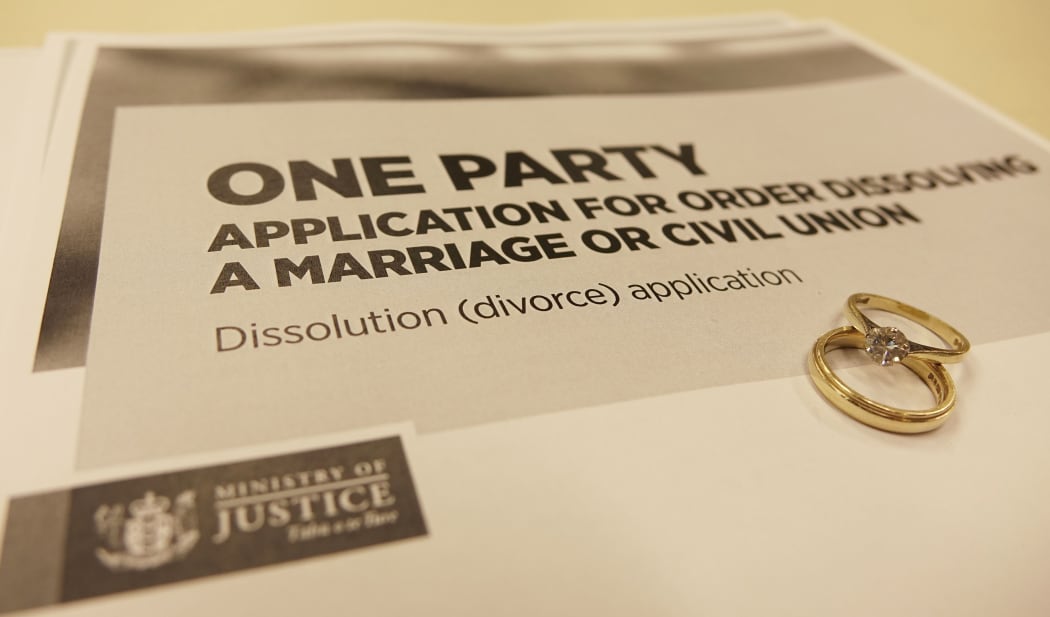Lawyers are warning more needs to be done to stop migrants from losing millions of dollars in property disputes.

Divorce papers and wedding ring Photo: RNZ/Teresa Cowie
The Law Commission has released a number of proposals to make property law fairer and easier to understand - but it could be some time for these changes to come into effect.
A recent survey done by Otago University shows 84 percent of people born in New Zealand know that after three years as a couple, all property becomes relationship property and is split 50-50 in a break up.
For those not born in New Zealand, that understanding was only 67 percent.
Three-quarters of New Zealanders understood that this law applied to married and un-married couples, but only half of migrants knew this.
Property lawyer and Chinese national Penny Liu said at least once a week she heard from someone with a similar story.
"The client came to me in a panic, basically worried that she won't get her money back at all.
"She's headed toward retirement age and is worried she won't have any resources left."
Ms Liu was describing a recent client who sent money over from China to her daughter and her son-in-law so they could buy a house. The daughter's relationship ended in June and her husband was now entitled to half of the house.
"My client sold her family home and then transferred $400,000 cash over - which was everything she's got.
"She was living in China and there was no one there to give her advice - nor did she think it was necessary to get any advice because it's her daughter who she trusts.
"The original intention was to help them out, to get them into a nice home, but the problem is because there was no correspondence no proof that her intention was to give it as a loan that would need to be paid back. It's very stressful for her knowing that the money has essentially evaporated."
She said it was very common for parents to send their children everything, however it was when the child moved a partner in that things got complicated.
"All of a sudden the law kicks in and when that relationship ends and the parents realise half of that money is gone to someone that they haven't even met."
September quarterly figures from Stats NZ show two percent of homes sold went to those without citizenship or residency.
But divorce lawyer Jeremy Sutton said cases involving migrants made up around a quarter of relationship dispute cases.
"It'd be 20 to 25 percent would be migrant cases. In some practices it's much higher than that but the amount of migrant cases that are going through the court is a decent proportion overall.
He said proposed changes to the Property Relationship Act, like pre-relationship property not be subject to a 50-50 split would help in some ways but there was still the potential for people to get caught out.
"Sometimes there's been some discussions between the parties but there's not a piece of paper to determine how this money is to be determined in event of a separation."
Both lawyers agreed better education was the only way things could improve.
Mr Sutton said real estate agents, bankers, mortgage brokers and the lawyers all had a chance to say something during the house-buying process and could be doing more.
Ms Liu has run seminars for the migrant community on the topic for the past two years.
"There's still quite a gap in the migrant community as to the understanding of what applies to their situation and that's why you get a lot of disputes and a lot of litigation."
She said language barriers stopped a lot of migrants from seeking legal advice.
"Unfortunately you can't just get help from a translator because you need someone who speaks the 'legal language' if you like, as well as 'the language,' and we don't have a lot of people who do.
"The legal profession hasn't grown to be able to cater for the needs of the migrants. This group is pretty much out there in the dark."
Ms Liu also said more people were starting to ask questions since the foreign buyer ban, which was an unintended - but good consequence.



